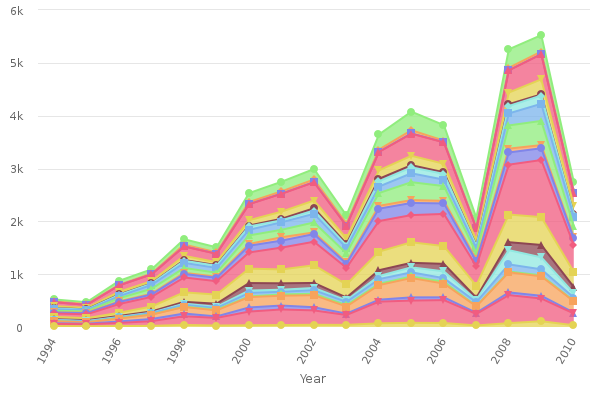Datasets
Datasets are arranged by type. Click on a dataset name to expand its description (including date range) as well as to download a .csv of current data and a .pdf codebook that documents included variables. For information on how to cite this data please visit our how to cite page.
Media
-
Newspaper De Standaard
This dataset contains data from newspaper De Standaard from 1999 to 2008. CAP topic codes have been manually coded. Krippendorf’s alpha reliability estimates are given at the end of the document. The data between January 1999 and February 2004 include newspaper articles from the front page of De Standaard only. The data between March 2004 and December 2008 include newspaper articles from the first three pages of De Standaard. This is done because the newspaper changed its format in March 2004, limiting the amount of articles on the front page to only one or two.
20963 observations spanning the years 1999 to 2008
download dataset
download codebook
-
Television News
The television data contain news items from two broadcasters: VRT (the public broadcaster) and VTM (the commercial broadcaster). The data range from 6 December 2000 to 12 January 2008. Every news item is coded based upon one sentence that summarizes the news item. Coders have thus not watched the news broadcasts themselves – codes are based on the brief summary of the item only.
135582 observations spanning the years 2000 to 2009
download dataset
download codebook
Parliamentary & Legislative
-
Bills
This dataset contains all bills introduced in the period between January 1988 and May 2010. CAP topic codes have been automatically coded, based on a conversion of the EUROVOC-code of the bill into the appropriate CAP code. The European EUROVOC-thesaurus consists of 6,797 words and EUROVOC-codes have been assigned to each bill by the administration of the Parliament. The file contains only those bills that are discussed in the federal House of Representatives (Senate not included).
15682 observations spanning the years 1988 to 2022
download dataset
download codebook
-
Oral questions and interpellations
The data contains the oral parliamentary questions and interpellations from 5 October 1988 to 21 April 2010, asked in the plenary meeting (= “plenaire vergadering”) or in one of the committee meetings. CAP topic codes have been automatically coded, based on a conversion of the EUROVOC-code of the question/interpellation into the appropriate CAP code. The European EUROVOC-thesaurus consists of 6797 words and EUROVOC-codes are assigned to each question/interpellation by the administration of the Parliament.
48381 observations spanning the years 1988 to 2010
download dataset
download codebook
Prime Minister & Executive
-
Government Agreements
This dataset contains most available government agreements from 1978 until 2008. Agreements were coded by hand at the lowest – quasi-sentence – level. Hence, some sentences have been split into several sub-items. Once split, all quasi-sentences were coded in response to the question ‘which issue is this argument emphasizing?’ Each quasi-sentence was then coded on its issue content using the comparative agendas codebook.
12936 observations spanning the years 1979 to 2008
download dataset
download codebook
-
State of the Union Speeches
This dataset contains state of the unions (yearly government speeches) from 1993 until 2009. State of the unions were coded by hand at the lowest – quasi-sentence – level. Hence, some sentences have been split into several sub-items. Once split, all quasi-sentences were coded in response to the question ‘which issue is this argument emphasizing?’ Each quasi-sentence was coded on its issue content using the comparative agendas codebook.
4783 observations spanning the years 1993 to 2009
download dataset
download codebook
Political Parties
-
Party Manifestos
This dataset contains most available party manifestos from 1977 until 2007. Manifestos were coded by hand at the lowest – quasi-sentence – level. Hence, some sentences have been split into several sub-items. Once split, all quasi-sentences were coded in response to the question ‘which issue is this argument emphasizing?’ Each quasi-sentence was then coded on its issue content using the comparative agendas codebook.
174994 observations spanning the years 1977 to 2007
download dataset
download codebook
download master topics codebook
Explore Policy Trends

Click to explore policy trends with Belgium pre-selected.
The Trends tool allows for policy comparisons across governing institutions and countries.
The Belgian agenda-setting project collected issue attention data from different institutions and actors over a period of more than ten years.
Principal Investigator: Stefaan Walgrave
Location: Department of Political Science, Sint-Jacobstraat 2, 2000 Antwerp
Email: stefaan.walgrave@uantwerpen.be
Downloadable Data Series: 7
Time Span: 1977-2022
Total Observations: 413,321
Sponsoring Institutions
Funding for the Belgian agenda-setting project came from the European Science Foundation (grant number: 07-ECRP-008), from the Flemish National Science Foundation (grant number: G.0117.11N) the Belgian Federal Science Policy (grant number: IUAP P7/46), and the TOP BOF University of Antwerp Grant (grant number FFB210426).
Belgian agenda-setting project
Featured Research:
Political agenda-setting moderated by conflict framing
 In a recently published article, Julie Sevenans and Rens Vliegenthart investigate the role of conflict framing as a moderator of the political agenda-setting effect. Conflict is at the heart of politics: political debate arises from political actors taking opposing positions. It is hypothesized that conflict framing in media coverage enhances the relevance of the news for politicians, who in turn react more to this news in parliament. The expectations are tested by ...
Read more
In a recently published article, Julie Sevenans and Rens Vliegenthart investigate the role of conflict framing as a moderator of the political agenda-setting effect. Conflict is at the heart of politics: political debate arises from political actors taking opposing positions. It is hypothesized that conflict framing in media coverage enhances the relevance of the news for politicians, who in turn react more to this news in parliament. The expectations are tested by ...
Read more









